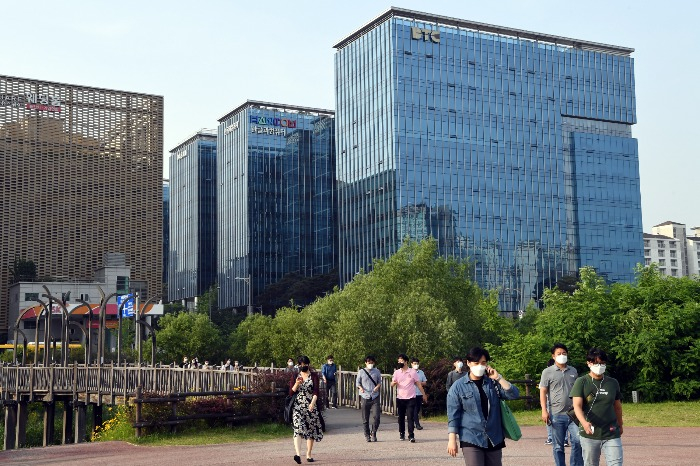Pangyo, Bundang among Asia's hot office areas, DWS says
Pangyo, dubbed as Korea's Silicon Valley, and neighboring Bundang, will lead rental outperformance with improving infrastructure
By Dec 20, 2021 (Gmt+09:00)
LG Chem to sell water filter business to Glenwood PE for $692 million


Kyobo Life poised to buy Japan’s SBI Group-owned savings bank


KT&G eyes overseas M&A after rejecting activist fund's offer


StockX in merger talks with Naver’s online reseller Kream


Mirae Asset to be named Korea Post’s core real estate fund operator



The report highlighted Pangyo and Bundang, both around 10 kilometers from southern Seoul, as the most popular office locations for South Korea’s IT and gaming companies. It also said the areas have growing demand from offices and laboratories in the life sciences, automobile and manufacturing industries. The connectivity with Gangnam and the two areas has been significantly improved since a new subway line opened in 2011, cutting the travel time to Gangnam from 45 to 14 minutes, the report added.
Since the completion of the first office building in 2009, Korea’s so-called Silicon Valley Pangyo has grown rapidly to become the fourth-largest office submarket with more than 3 million square meters of office stock, 1,300 companies and 70,000 employees, the report said. Bundang has long been the traditional office fringe area of Gangnam with 1 million square meters of office stock, it added.
Vacancy rates in the two areas will converge towards its long-term average, and the emerging locations will drive rental outperformance over time with potential gains from improving the infrastructure of new business clusters, the report said.
Meanwhile in Australia, despite increased vacancy rates due to growing supply in areas such as North Sydney and the Melbourne City Fringe, long-term vacancy rates generally sit below those of the central business districts, the report wrote. The life science sector is expected to advance further as funding to this sector has risen amid the pandemic, DWS said. Life science clusters, such as Macquarie Park on the North Shore of Sydney, are supporting infrastructure for companies seeking collaborations with universities and hospitals, the report added.
In Japan, Tenjin and Hakata, two established office submarkets of Fukuoka's central business district, are seeing a rise in younger populations and tech companies, the report said.
It said that the Hakata office submarket, a primary choice for office tenants looking for good transportation connectivity, is still growing given the adjoining Hakata train station with its rapid Shinkansen train services and links to the Fukuoka International Airport. Fukuoka’s office market has been under the radar for a long time, mainly due to the lack of investable assets and building height restrictions, such as 76 meters or 16 to 17 floors for the maximum height of office buildings. The limitation capped the floor area size, and thus deal size, for institutional investors, the report wrote.
Write to A-Young Yoon at youngmoney@hankyung.com
Jihyun Kim edited this article.
-
 Artificial intelligenceOffice investment falls 15% in Q3 2021, CBRE says
Artificial intelligenceOffice investment falls 15% in Q3 2021, CBRE saysOct 26, 2021 (Gmt+09:00)
2 Min read -
 Real estateTime to invest in luxury hotels in Korea: JLL executive
Real estateTime to invest in luxury hotels in Korea: JLL executiveSep 28, 2021 (Gmt+09:00)
4 Min read -
 Real estateNPS in $2 bn real estate development project in Seoul
Real estateNPS in $2 bn real estate development project in SeoulAug 26, 2021 (Gmt+09:00)
2 Min read -
 Artificial intelligenceOffice tower near Seoul up for sale for about $900 mn
Artificial intelligenceOffice tower near Seoul up for sale for about $900 mnAug 13, 2021 (Gmt+09:00)
2 Min read -
 GIC, M&G Real Estate in $400 mn bid for POBA-owned Korean building
GIC, M&G Real Estate in $400 mn bid for POBA-owned Korean buildingDec 07, 2017 (Gmt+09:00)
2 Min read -
 KKR, POBA plan to sell commercial buildings in Korea for $1 bn
KKR, POBA plan to sell commercial buildings in Korea for $1 bnNov 17, 2017 (Gmt+09:00)
3 Min read


